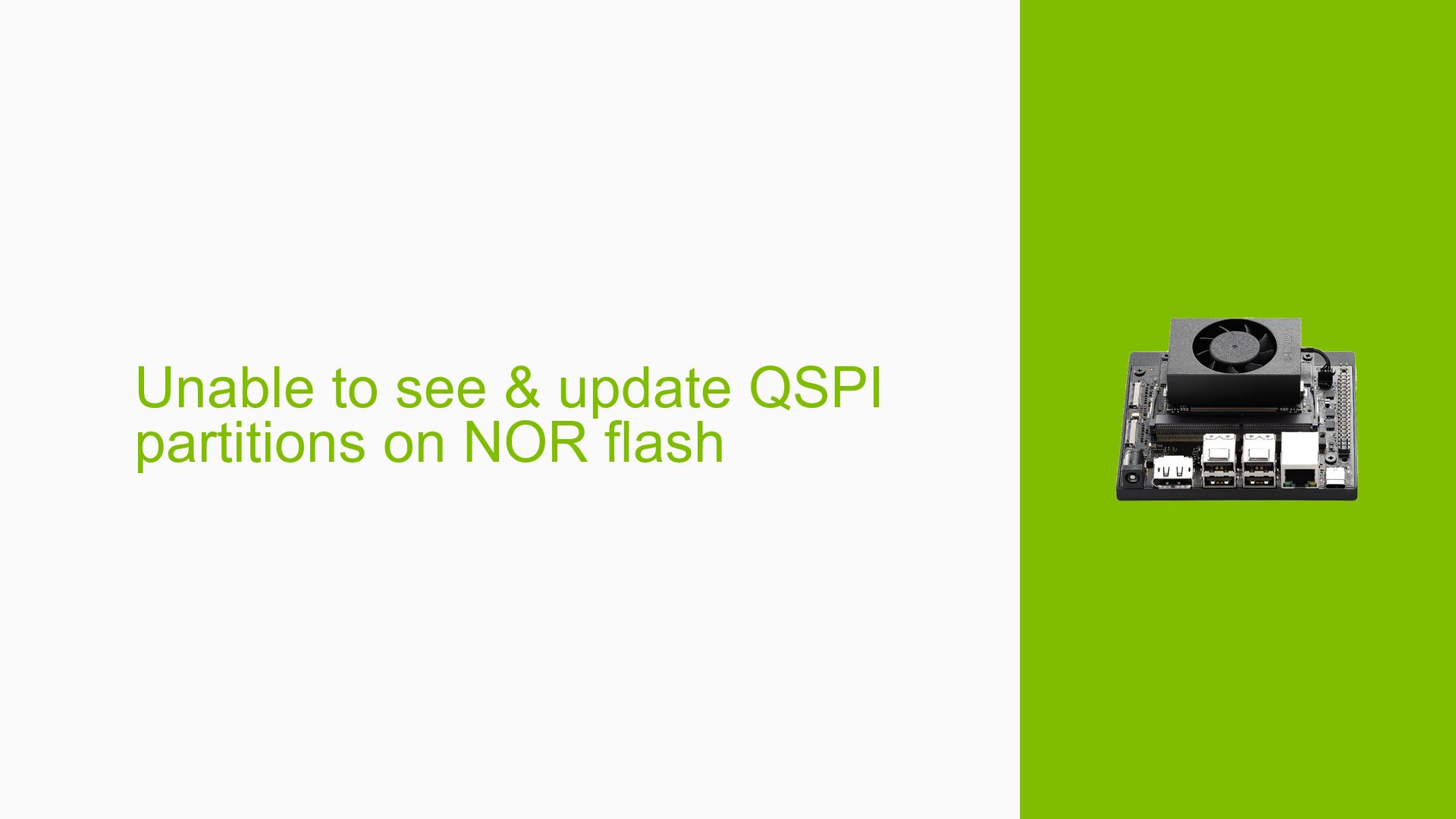Unable to see & update QSPI partitions on NOR flash
Issue Overview
Users of the Nvidia Jetson Orin Nano development kit are experiencing difficulties accessing and updating QSPI (Quad Serial Peripheral Interface) partitions on NOR flash memory when using the Yocto flow to create an operating system. The main symptoms include:
-
Absence of MTD Entries: Users report that there are no Memory Technology Device (MTD) entries visible under
/dev, and the directory/sys/class/mtd/is empty. -
Lack of Kernel Messages: There are no related messages in the kernel log (
dmesg), indicating that the system is not recognizing the QSPI NOR flash. -
Initrd Flash Mechanism: The initrd flash script appears to successfully upload a kernel that enables access to
/dev/mtd1, allowing updates to the QSPI NOR flash. This raises questions about what differentiates this process from the standard user operation. -
Device Tree Issues: Users have decompiled the device tree binary (DTB) file and found an SPI entry (
spi@3270000) with an associated section (spiflash@0), but the expected/proc/spi@3270000/directory is absent in the running system.
The issue occurs during setup or while attempting to implement a runtime update mechanism for essential components like root filesystem, kernel, and device tree blobs (DTBs). This problem can significantly hinder system functionality, particularly for users intending to maintain or upgrade their systems dynamically.
Possible Causes
-
Hardware Incompatibilities: The Jetson Orin Nano may have specific hardware configurations that do not support direct access to QSPI NOR flash under certain conditions.
-
Software Bugs or Conflicts: There may be bugs in the Yocto build or conflicts with other software components that prevent proper initialization of the QSPI interface.
-
Configuration Errors: Incorrect configurations in the Yocto build or device tree may lead to missing MTD entries and prevent access to necessary hardware resources.
-
Driver Issues: The absence of appropriate drivers for handling QSPI NOR flash could result in failure to recognize and interact with these memory devices.
-
Environmental Factors: Issues such as power supply inconsistencies or temperature extremes could affect hardware performance, leading to sporadic recognition of memory devices.
-
User Errors or Misconfigurations: Users might inadvertently misconfigure settings in their build or during flashing, leading to these accessibility issues.
Troubleshooting Steps, Solutions & Fixes
-
Verify Hardware Connections:
- Ensure that all hardware connections are secure and that there are no physical defects in the Jetson Orin Nano board.
-
Check Device Tree Configuration:
- Review the device tree configuration used in your Yocto build. Ensure that entries for SPI and QSPI are correctly defined.
- Use a command like
dtc -I fs -O dts /proc/device-tree > device_tree.dtsto extract and inspect your current device tree.
-
Inspect Kernel Logs:
- Use
dmesg | grep mtdto check for any messages related to MTD devices during boot. This can provide clues about what is being initialized.
- Use
-
Update Yocto Build Configuration:
- Ensure you are using a compatible version of Yocto with your Jetson Orin Nano. Check for any patches or updates related to QSPI support.
- Review your
local.confand other configuration files for any settings that might affect MTD visibility.
-
Rebuild and Flash Initrd:
- If possible, try rebuilding the initrd image. This can often resolve issues where changes in configuration do not propagate correctly.
- Follow this command structure for rebuilding:
bitbake <your-image-name>
-
Test with Different Kernels:
- If you have access to different kernel versions, test them by flashing an alternative kernel that is known to work with QSPI interfaces.
-
Check for Driver Updates:
- Look for any available driver updates specific to QSPI or SPI interfaces from Nvidia or community sources.
-
Consult Documentation:
- Refer to Nvidia’s official documentation regarding the Jetson Orin Nano and its memory management features, especially concerning QSPI operations.
-
Community Forums & Support:
- Engage with Nvidia forums or relevant communities where similar issues may have been discussed. Often, users share successful solutions that can be applied directly.
-
Log Environmental Conditions:
- Monitor power supply stability and temperature conditions during operation, as these can impact hardware performance.
If multiple users report success with a particular solution, it should be highlighted as a recommended approach. For instance, ensuring correct device tree configurations has been noted as a critical step by several users facing similar issues.
Further investigation may be needed if these steps do not resolve the issue, particularly regarding potential hardware defects or deeper software conflicts within the Yocto environment.
